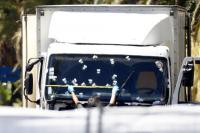-
Armed French police deployed on Channel ferries

Passenger ferries going between Britain and France are now being accompanied by armed sea patrols to protect them from jihadist attacks. In addition, marine gendarmes are now placed on ferries in the Channel and North Sea, as the two countries are in talks about allowing French security personnel togo on board ferries before the ferries leave English ports.
-
-
DHS grant supports research into espionage prevention

Researchers have received a $649,172 grant from the U.S. Department of Homeland Security to strengthen insider threat detection. The research will involve building an insider threat detection system to prepare for real-world situations wherein a disgruntled employee or even a corporate spy could abscond with valuable information. The researchers are not interested in finding the culprit after an attack has already occurred.
-
-
Live-streaming crime incidents a challenge U.S. privacy law
In July, the fatal police shootings of Alton Sterling and Philando Castile went viral on social media. The aftermath of the Castile shooting was first shared via Facebook Live, which is a type of mobile streaming video technology (MSVT) that allows users to stream live video to followers, similar to Periscope and Meerkat. The two incidents focus attention on the legal rights of people to record and live stream and any potential right to be free from being recorded and streamed in public places.
-
-
ISIS now operates in 18 countries: WH briefing document
A leaked briefing document written for the White House says that ISIS has “fully operational branches” in eighteen countries. A 2014 State Department documents said that ISIS was operating in only seven countries. In twelve countries, ISIS has “official branches,” and in six more countries it has “aspiring branches.”
-
-
600 armed police officers to protect London
The London police has launched Operation Hercules in which additional firearms officers will be deployed in visible roles in the capital. The Met will add 600 additional firearms officers to protect London against any attack. The first are now fully trained and operationally ready.
-
-
July 2016 terrorism: The numbers
The House Homeland Security Committee has just released its August Terror Threat Snapshot. The snapshot, produced by the Majority Staff of the committee, is a monthly committee assessment of the threat America, the West, and the world face from ISIS and other Islamist terrorists.
-
-
Apprehension: Aspen gathering of worried terrorism, security officials
An air of foreboding hanged over last week’s Aspen Security Forum, an annual gathering of the U.S. top past and present defense, intelligence, counter-terrorism, and diplomatic figures who are focused on protecting the American homeland. “All these recent terror attacks on soft targets, the growing cyberattacks, suggest this is the new normal, and it’s going to be with us for a while,” former Homeland Security inspector general Clark Kent Ervin said. “We’ve got all these evolving threats coming at us, and it’s disturbing that we did not see around the corner and anticipate this two years ago.”
-
-
Risk of Paris-, Nice-like terror attacks in U.K. remains a case of “when, not if”: Met commissioner

Britain is well prepared to prevent terrorist attacks similar to those which took place in France and Germany in recent weeks, but such an attack in Britain remains a question of “when, not if,” Sir Bernard Hogan-Howe, the commissioner of the Metropolitan police has said. Hogan-Howe said he was hoping to reassure the British public in the wake of recent terrorist attacks on the continent, but he admitted that the reality of the situation made it impossible to guarantee that there would be no terrorist attacks in Britain.
-
-
Remotely disabling non-cooperative vehicles
As they strive to keep the public safe, one of the key challenges facing European security services is the ability to control and stop, at distance, non-cooperative vehicles posing a threat. However, this ability presents more than a technical challenge. To comply with EU legislation, as well as adhere to ethical concerns, the technology would also have to be safe for the user, the driver (and passengers), as well as members of the public and the material infrastructure of the surrounding environment. In lab bench testing, researchers evaluated signal frequency, waveform, and duration — principally of electromagnetic pulses (EMP) and high power microwaves (HPM) — to determine which could best disrupt the functioning of a vehicle’s electronic components.
-
-
Putting the wave of Islamist violence in Europe in historical context, perspective
From the November 2015 terrorist attacks in Paris to the March 2016 attack on Brussels airport to the Bastille Day attack in Nice to the killing of a priest in north-west France, to the spate of violence in Germany, the viciousness of Islamist terrorism in Europe has shocked people in Europe and around the world. Two scholars — one left-leaning, the other a conservative historian – say that when the recent wave of Islamist terrorism in Europe is put in a global and historical context, the figures and headlines suggest a different perspective on the global spread of terrorism and its victims.
-
-
Recruiting technology companies to combat extremism on social media
Extremists are exploiting the Internet. A new study aims to shed light on how accessible extremist content is beyond social media, with a particular focus on the role played by the search engine Google. Initiatives for better understanding extremism on the Internet have predominantly been led by experts in extremist ideology or the sociological aspects of radicalization. Technology firms, key stakeholders in this fight, have played a less prominent role.
-
-
Israel opens border with Syria to humanitarian aid deliveries
The Israeli government has authorized the delivery of humanitarian aid into war-torn Syria through the nations’ shared border. While Israel activists have sought to help Syrians in the past, delivering aid across the border has been complicated by the fact that many towns and cities on the Syrian side of the Golan Heights are controlled by the Islamic State or the al-Nusra Front, an affiliate of al-Qaeda.
-
-
Killer of French priest was in jail for trying to join ISIS, but was paroled in March
Adel Kermiche, the mentally disturbed 19-year old ISIS follower who slit the throat of a Catholic priest during mass in the small town of Saint-Étienne-du-Rouvray, was sent to prison in May 2015 for trying to go to Syria to join ISIS, but was released on parole on March 2016 over the objections of the prosecution. Parts of his legal file, published in Le Monde, show that he had exhibited signs of “psychological troubles” since the age of six, and that he was regularly hospitalized for these problems.
-
-
Dutch police on lookout for three aging Baader-Meinhof gang members suspected in recent heists

Dutch police detectives are on the lookout for three aging German far-left militants who have disappeared decades ago but who have emerged as the main suspects in a series of recent robberies. Ernst-Volker Staub, 61, Burkhard Garweg, 47, and 57-year-old Daniela Klette are former members of the violent Red Army Faction (RAF) — also known as the Baader-Meinhof gang — a German militant group which terrorized Germany (then: West Germany) the 1970s and 1980s with a campaign of bombings, arson, kidnappings, and killings. The three militants are among a larger group of fugitives who have been on the run for three decades for membership of the Marxist RAF.
-
-
U.K. government should consider extremism strategy: Parliamentary panel

The Joint Select Committee on Human Rights of the British Parliament said the government should reconsider its counter extremism strategy, use the existing extensive legal framework for dealing with people who promote violence, and introduce new legislation only if it can demonstrate a significant gap. The committee’s report concludes that while there is agreement that tackling terrorism is a priority, there is no agreement about how to combat extremism, particularly since the government is also under a duty to uphold the democratic and human rights which terrorists so often aim to extinguish.
-
More headlines
The long view
Factories First: Winning the Drone War Before It Starts
Wars are won by factories before they are won on the battlefield,Martin C. Feldmann writes, noting that the United States lacks the manufacturing depth for the coming drone age. Rectifying this situation “will take far more than procurement tweaks,” Feldmann writes. “It demands a national-level, wartime-scale industrial mobilization.”
No Nation Is an Island: The Dangers of Modern U.S. Isolationism
The resurgence of isolationist sentiment in American politics is understandable but misguided. While the desire to refocus on domestic renewal is justified, retreating from the world will not bring the security, prosperity, or sovereignty that its proponents promise. On the contrary, it invites instability, diminishes U.S. influence, and erodes the democratic order the U.S. helped forge.
Fragmented by Design: USAID’s Dismantling and the Future of American Foreign Aid
The Trump administration launched an aggressive restructuring of U.S. foreign aid, effectively dismantling the United States Agency for International Development (USAID). The humanitarian and geopolitical fallout of the demise of USAID includes shuttered clinics, destroyed food aid, and China’s growing influence in the global south. This new era of American soft power will determine how, and whether, the U.S. continues to lead in global development.
Water Wars: A Historic Agreement Between Mexico and US Is Ramping Up Border Tension
As climate change drives rising temperatures and changes in rainfall, Mexico and the US are in the middle of a conflict over water, putting an additional strain on their relationship. Partly due to constant droughts, Mexico has struggled to maintain its water deliveries for much of the last 25 years, deliveries to which it is obligated by a 1944 water-sharing agreement between the two countries.
How Disastrous Was the Trump-Putin Meeting?
In Alaska, Trump got played by Putin. Therefore, Steven Pifer writes, the European leaders and Zelensky have to “diplomatically offer suggestions to walk Trump back from a position that he does not appear to understand would be bad for Ukraine, bad for Europe, and bad for American interests. And they have to do so without setting off an explosion that could disrupt U.S.-Ukrainian and U.S.-European relations—all to the delight of Putin and the Kremlin.”
How Male Grievance Fuels Radicalization and Extremist Violence
Social extremism is evolving in reach and form. While traditional racial supremacy ideologies remain, contemporary movements are now often fueled by something more personal and emotionally resonant: male grievance.
